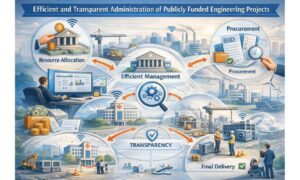Are you tired of the traditional classroom setting where theory seems to be disconnected from reality? Are you craving a practical approach that equips you with the skills needed to excel in your future career? Look no further! In this blog post, we will delve into the significance of practical skills in education and how they can truly bridge the gap between classroom learning and real-world success. Get ready to unlock your potential as we explore why hands-on experiences are crucial for your journey from classrooms to careers.
Introduction
The education system has always emphasized the importance of academic knowledge and theoretical understanding. However, with the rapidly changing job market, there is a growing need for practical skills in today’s workforce. In this blog post, we will discuss why it is important to focus on practical skills in education and how they can benefit students in their transition from the classroom to their careers.
Importance of discussing practical skills in education:
In recent years, there has been a significant gap between what is taught in classrooms and what employers expect from fresh graduates. Many students struggle to apply their knowledge and lack essential skills such as critical thinking, problem-solving, communication, and teamwork. This disconnect has led to a high unemployment rate among college graduates and has raised concerns about the effectiveness of traditional education.
With technological advancements and automation taking over many jobs that require repetitive or low-skilled tasks, employers are now seeking individuals who possess relevant practical skills that can add value to their organizations. Hence, it becomes crucial for educational institutions to shift their focus towards providing students with hands-on learning experiences that prepare them for real-world challenges.
The importance of practical skills in various industries cannot be denied. For instance, business schools are now including internships or apprenticeships as part of their curriculum to provide students with industry exposure and hands-on experience before entering the job market. Medical schools have also started incorporating simulated training programs to enhance students’ clinical abilities before they start working directly with patients.
Moreover, apart from boosting employability prospects, possessing practical skills can lead to greater career success. The ability to apply theoretical knowledge into practice not only makes one more competent but also increases confidence levels and improves overall job performance.
In addition to being beneficial for individual growth and career advancement, developing practical skills at an early stage can also contribute towards economic growth by bridging the skill gap in various industries.
The Traditional Education System
The traditional education system has been a cornerstone of societies for centuries, providing individuals with the knowledge and skills necessary to succeed in their future careers. However, one criticism that is often brought against this system is its heavy focus on theoretical knowledge rather than practical skills. This means that students are primarily taught through lectures, textbooks, and exams rather than hands-on experiences and real-life application of concepts.
One of the main reasons behind this emphasis on theory is the belief that it provides a strong foundation for understanding complex ideas and concepts. In many cases, theoretical knowledge can serve as a building block for acquiring practical skills later on. For example, learning mathematical formulas may not seem applicable to daily life or specific career paths at first glance. However, these theories can be applied in various ways such as budgeting or data analysis once understood.
Another factor contributing to the traditional education system’s focus on theory is the structure of standardized tests and exams. These assessments tend to prioritize memorization and regurgitation of information rather than critical thinking and problem-solving skills. As a result, students are trained to excel in these types of evaluations rather than developing practical skills that can truly benefit them in their future endeavors.
Moreover, the time constraints imposed by rigid curriculums also play a significant role in limiting opportunities for hands-on learning experiences. With strict schedules and predetermined course materials, teachers often have little flexibility to incorporate more practical activities into their lesson plans. This leads to an overwhelming amount of information being delivered through lectures or assigned readings without sufficient opportunities for students to apply what they have learned.
However, it cannot be denied that there has been growing recognition from educators about the importance of integrating practical skills into traditional education systems. Many schools have started implementing vocational courses or internships where students can gain experience in a particular field before entering the workforce fully.
While theoretical knowledge certainly holds value in preparing individuals for future careers, it should not be viewed as the be-all and end-all of education. Practical skills are equally essential in today’s constantly evolving job market, and it is crucial for educational institutions to find a balance between theory and application to equip students with the necessary tools for success.
The Changing Workforce
The workforce is constantly evolving, and with the rise of technology and automation, traditional job roles are being replaced by new ones. As a result, employers now value practical skills more than ever before when hiring new employees.
One major factor contributing to this shift in the job market is technological advancement. With advancements in artificial intelligence and automation, certain jobs have become obsolete while others require a completely different skill set. In today’s economy, having strong practical skills such as problem-solving, adaptability, and digital literacy are crucial for success in various industries.
Moreover, employers are placing a greater emphasis on practical skills due to the changing needs and expectations of customers. With an increase in demand for personalized and efficient services, companies are seeking employees who possess the ability to creatively solve problems and think critically. Practical skills enable individuals to quickly adapt to changes in customer demand and find effective solutions.
Another reason why employers prioritize practical skills is the increasing competition within industries. As businesses strive for success and growth, they require employees who can keep up with the fast-paced environment and bring innovative ideas to drive company growth. Practical skills like communication, teamwork, time management play a vital role in building a dynamic workplace culture that fosters collaboration and drives innovation.
Additionally, traditional education systems focus primarily on theoretical knowledge rather than practical application of concepts. This has created a gap between classroom learning and real-world job requirements. Employers recognize this gap and value candidates who possess hands-on experience through internships or apprenticeships over those with higher academic qualifications but no practical experience.
Furthermore, with remote working becoming prevalent due to the global pandemic situation; it has become essential for employees to have strong self-management skills as well as technical proficiency. The ability to work independently without constant supervision has gained significant importance amongst employers when considering potential hires.
There has been a significant shift in the job market where practical skills have emerged as key attributes sought after by employers when hiring new employees. Technological advancements, changing customer demands, intense competition among businesses, and the gap between classroom learning and real-world job requirements are all contributing factors to this change. Therefore, it is crucial for educational institutions to equip students with practical skills along with theoretical knowledge to prepare them for the constantly evolving workforce.
The Benefits of Practical Skills in Education
In recent years, there has been a growing shift towards the incorporation of practical skills in education. Traditional theoretical teaching methods have long been the backbone of education systems globally, but with changing times and demands from the workforce, there is a need to equip students with practical skills that can help them succeed in their future careers.
One of the most significant benefits of incorporating practical skills into education is better preparation for the workforce. The traditional approach to education often focuses on theoretical knowledge without providing students with hands-on experience. This often creates a gap between what students learn in classrooms and what they encounter in real-world work settings. By including practical skills in education, students are exposed to real-life scenarios and acquire essential competencies that are highly valued by employers.
Furthermore, incorporating practical skills into education also helps improve critical thinking abilities. Practical learning often involves problem-solving tasks that require students to think critically and come up with creative solutions. This not only enhances their problem-solving skills but also encourages them to think outside the box and see things from different perspectives. In today’s fast-paced world where innovation and adaptability are highly valued, having strong critical thinking abilities is crucial for success.
Another benefit of incorporating practical skills into education is promoting hands-on learning experiences. Many individuals find it easier to learn through doing rather than reading or listening passively. Engaging students in hands-on activities allows them to apply classroom concepts in a tangible manner, making learning more enjoyable and effective. This approach also helps build confidence as students can see firsthand how their knowledge can be put into practice.
Additionally, incorporating practical skills into education promotes teamwork and communication among students. Most jobs today require individuals to work effectively as part of a team, so it is essential for educational institutions to foster these collaborative skills early on. Practical learning often involves group projects or simulations that encourage collaboration and effective communication among peers.
Integrating practical skills into education brings numerous benefits that cannot be underestimated. From better preparation for the workforce to improved critical thinking and teamwork abilities, these skills are crucial in today’s job market. Educational institutions must continue to recognize the value of practical learning and strive to incorporate it into their curriculum to prepare students for a successful future.
Conclusion
In today’s rapidly evolving job market, practical skills are becoming more important than ever. As technology and industries continue to change, it is crucial for educators to prioritize hands-on learning experiences in order to prepare students for their future careers. By incorporating real-world scenarios and opportunities to develop practical skills, schools can better equip their students with the necessary tools for success in a competitive workforce. Let us embrace the value of practical skills in education and strive towards creating well-rounded individuals who are ready to tackle any challenge that comes their way.



































